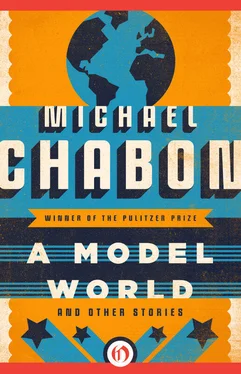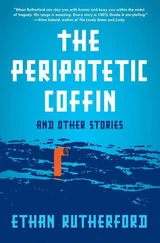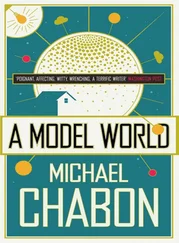Michael Chabon - A Model World And Other Stories
Здесь есть возможность читать онлайн «Michael Chabon - A Model World And Other Stories» — ознакомительный отрывок электронной книги совершенно бесплатно, а после прочтения отрывка купить полную версию. В некоторых случаях можно слушать аудио, скачать через торрент в формате fb2 и присутствует краткое содержание. Год выпуска: 2011, Издательство: Open Road Media, Жанр: Современная проза, на английском языке. Описание произведения, (предисловие) а так же отзывы посетителей доступны на портале библиотеки ЛибКат.
- Название:A Model World And Other Stories
- Автор:
- Издательство:Open Road Media
- Жанр:
- Год:2011
- ISBN:нет данных
- Рейтинг книги:5 / 5. Голосов: 1
-
Избранное:Добавить в избранное
- Отзывы:
-
Ваша оценка:
- 100
- 1
- 2
- 3
- 4
- 5
A Model World And Other Stories: краткое содержание, описание и аннотация
Предлагаем к чтению аннотацию, описание, краткое содержание или предисловие (зависит от того, что написал сам автор книги «A Model World And Other Stories»). Если вы не нашли необходимую информацию о книге — напишите в комментариях, мы постараемся отыскать её.
A Model World And Other Stories — читать онлайн ознакомительный отрывок
Ниже представлен текст книги, разбитый по страницам. Система сохранения места последней прочитанной страницы, позволяет с удобством читать онлайн бесплатно книгу «A Model World And Other Stories», без необходимости каждый раз заново искать на чём Вы остановились. Поставьте закладку, и сможете в любой момент перейти на страницу, на которой закончили чтение.
Интервал:
Закладка:
They made up nicknames for his colleagues at Sunny Valley and for Nathan’s schoolmates, wrought long chains of bad puns, sang operatic versions of advertising jingles. Dr. Shapiro had few friends, and his older son, from the time of his first words, had been the chief partner in his imaginative life. He knew that it could not be good for a father to depend in this way on his child, and disapproved of himself for it; he supposed that his was not an adult need at all, and that he should long ago have surrendered the soothing foolishness of words. Once, he had been able to dwell with Nathan for hours on end in a perpetually expanding universe of nonsense, but as they both got older, and as marital unhappiness and financial ambition and the passage of time came increasingly to dominate his thoughts, these hours had shrunk to the three they spent visiting libraries each week. Dr. Shapiro’s need had never diminished, however, and had, if anything, been strengthened, in recent months, by the changing character of their conversations. Nathan tended increasingly to pose difficult questions that required careful replies, asked him to explain the rings of Saturn, the partition of India, the New York subway. The ardor of Nathan’s desire for facts seemed to quicken a sympathetic current within the father, and his heart would pound as he endeavored, despite damnable gaps in his knowledge, to provide his son with good information.
One Thursday evening, about two weeks before the beginning of the summer, Dr. Shapiro at last found himself faced with the task of explaining to Nathan the nature of divorce. He was loath to derange their weekly idyll with this particular collection of sad facts, but he had been putting it off for nearly a month now, and come Saturday he would — how incredible — no longer be living within the same building as his family. It would have to be tonight.
It was a windy, damp evening with no trace of June in it, and as they drove into the pale, almost imperceptible sunset he toyed with the idea of leaving without saying a word, of truly deserting Nathan — as his own father had done, in a different way, a year ago. The thought of his own insubstantiality, of his capacity simply to vanish, was horrible and seductive.
They had just come from the G. Earl King Memorial Branch, sixth on their route, and were headed for Lucci’s, the Italian delicatessen where they always broke their trip. Nathan, who’d been unusually silent all evening, had a stack of paperbacks balanced on the back of his bent right forearm and was attempting to play Quarters with them, to grasp them abruptly in his hand before they could fall. They kept spilling across the front seat, over and over, with a disturbed, truncated flutter, as of startled pigeons. One struck Dr. Shapiro on the cheek, and the boy jumped preemptively away so that his father could not strike back, but Dr. Shapiro did not respond. It seemed to him that the road flew beneath them, that they had not hit a single red light, that there was nothing to slow their hurtling career. They were less than five minutes from Lucci’s. Generally, he knew, he burdened his son with bad news or disapprobation in restaurants, for reasons that were unclear to him, and he didn’t want it to happen that way this time. Unless he spoke now, he would have to wait until after they had eaten their pink, oily submarines and were on their way to the Cross Fork Branch, the very best, when he would not want to spoil for Nathan the prospect of its luxurious Young Adults Room, with the potted palms and microfilm machines. He cleared his throat and cursed his own cowardice; he foresaw himself stalling until the last possible moment, sputtering out the words in the darkness of their driveway as with a ponderous hand he restrained his son from getting out, as he cut the engine and the interior filled with the sighs and ticking of a car at journey’s end.
“I’m sorry, Dad,” said Nathan, arranging his books now into a neat and penitent stack on the seat between them and folding his hands in his lap.
“It’s all right,” Dr. Shapiro replied. Then he was aware of the throbbing of his cheek where the book had hit him, a triangular pain over the bone. “It was an accident.”
“Yes, that’s right,” Nathan said. “It was an accident.”
The boy smiled at him with his wild teeth, and his bright eyes behind the heavy eyeglasses looked false, a little out of kilter, as though his son were a doll of humble workmanship. Like those of his patients, Nathan’s was an almost heartbreakingly plain face, and in it he thought he could read the same short narrative of rage and confusion. He had resolved a hundred times not to be a doctor to his sons, not to listen for and study the messages coded in their sudden misbehaviors, and to allow his children to disarm and to perplex him, but as he looked at Nathan he saw quite clearly that the boy was cognizant, however dimly, of the fear and shame and failure his father could not bring himself to express, and had already begun — accidentally— to retaliate. Dr. Shapiro’s information was suddenly an unbearable weight upon him, an iron belt around his chest.
“Ask me anything,” he said, too loudly, taking his foot off the accelerator pedal. The car slowed and then drifted to a halt in the middle of Old Rolling Road, five hundred yards from the next intersection. “Isn’t there anything you’d like me to explain?”
Nathan looked over his shoulder, out the rear window, then turned back to face Dr. Shapiro. He bit his lip and at the same time smiled the anxious, sober smile of someone confronted with the folly, the minor act of vandalism, of a friend on a drunken spree. The few drivers lined up behind them honked their horns, then swerved brusquely around, shaking their fists as though in encouragement. “Do it!” they exhorted him. “Let the kid have it!” For a moment they sat all alone in their car, in the empty roadway, as Nathan seemed to search for the name of some thing he didn’t know or had until now never quite grasped.
“If I was a mutant,” the boy said at last, his gaze falling on the gaudy cover of one of the paperbacks, a novel called More Than Human , “would you and Mom ever tell me?”
Dr. Shapiro gave a sigh that was like a laugh, weary and slight. “No,” he said. He had turned his damp face toward the window, ashamed, unable to preserve his son any longer. “I think we would just have to let you find out for yourself.” He braced himself for the sentence he was about to utter and pushed down on the gas. The car gathered speed and drew relentlessly toward the intersection. He opened his mouth to speak, closed it, opened it once more.
“Then I guess I already know,” said Nathan, from whom he had failed to conceal, failed to deflect, failed to ward off all the hazardous radiations of adulthood, of knowledge, of failure itself.
On the day his father moved out, Nathan’s parents sent him and Ricky to the mall with his friend Edward, a decision of which, on the whole, Nathan approved. Although a part of him was curious simply to see what it looked like when one’s father carried his things, his books and records and pipes, out the door — he loved those rare occasions, when Dr. Shapiro, puffing out his bearded cheeks, engaged in some heavy labor — he had caught a glimpse that morning of a liquor box, full of hats, on the floor of his parents’ bedroom, and the sight of a black Russian hat made of fur that was swirled like a brain, which Nathan remembered his father wearing on some black-and-white winter day before Ricky was ever born, had filled him with such longing and anger that he was glad to spend the afternoon eating pizza and wishing for toys in the Huxley Mall, whose air was sweet with candles and soap, and bitter with the chlorine from the fountains.
Читать дальшеИнтервал:
Закладка:
Похожие книги на «A Model World And Other Stories»
Представляем Вашему вниманию похожие книги на «A Model World And Other Stories» списком для выбора. Мы отобрали схожую по названию и смыслу литературу в надежде предоставить читателям больше вариантов отыскать новые, интересные, ещё непрочитанные произведения.
Обсуждение, отзывы о книге «A Model World And Other Stories» и просто собственные мнения читателей. Оставьте ваши комментарии, напишите, что Вы думаете о произведении, его смысле или главных героях. Укажите что конкретно понравилось, а что нет, и почему Вы так считаете.












